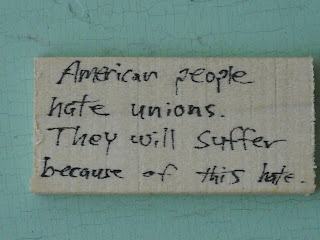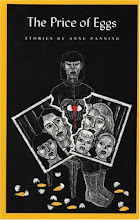
Unlike Saigon’s back packer district where grizzled old army vets in tank tops and tattoos could be found drinking beer at any hour of the day, Bangkok’s Khao San Road seemed to be populated by the twenty and under crowd. Everyone was young and cool and international with an earth-grunge-free-love-but-can- afford -to-travel -extensively-and -wear -real -Crocs-and-Ray Bans way. As we dragged our two children, Hudson and Lily, through the crowded sidewalks, a hippie wannabe wearing overalls and Birkenstocks sang “Wish You Were Here” by Pink Floyd. Beside him hung a rack of t-shirts with rasta-colored marijuana leaves on them. At the next stall, little paper containers of phad thai were for sale for fifty cents and looked like they’d been withering out in the sun all day. The phad thai vendor’s t-shirt read: “I Lost My Virginity in Madagascar.”
Other things for sale on Khao San Road:
•camo cargo shorts
•batik halter top
•fresh mangoes and sticky rice
•fake spongy Crocs
•Camus, Hesse, Dostoyevsky novels
•wraparound peasant skirts
•bootleg Xeroxed Lonely Planet guides
•toe rings and silver ankle bracelets with little bells on them
•tie-dyed sarongs
•a black t-shirt that said “Dave Hits 50!
•brass incense holders
•patouchouli oil
•people who would dreadlock or French braid your hair
The young twenty-something set I could actually deal with; we both taught college, after all, and were used to being more than twice the age of our students. No, our biggest tactical error about traveling to Bangkok was the all-out oppressive heat. It was beginning to make me sick and feeble. As we plowed through the hot crowded streets, Lily kept pulling on my hand, begging to go back to our hotel, to please let her go swimming in the pool. By that point, however, Hudson had become hellbent on buying a small Thailand flag with the bhat he’d earned earlier by massaging our feet and by cleaning up errant puzzle pieces off the floor. Hudson had been collecting flags from all the countries he’d visited . So far, he’d scored Vietnam, Singapore, Taiwan and Canada, but we were having a hard time finding aThai flag among the hippie detritus of Khao San Road.
Once we arrived back in our room (alas, no Thailand flag purchased), we were startled to see men dangling right in front of our window outside. Our room was not ideal anyway: it faced a cement wall and was dreary and damp, but now there were four men staring in at us. I called the hotel desk three times, but they blew me off. I whipped the curtains closed, but they were so thin you could see right through. The men soon began pounding against the side of the building with mallets and hammers. Our walls shook. I called again. We were paying good money for the room! I complained. This was unacceptable! But again, the manager, clearly used to bitchy American tourists, put me off. “Nothing else available except the suite I told you about earlier. It is $150 U.S.”
Later, after we’d all taken a stultifying two-hour nap, I woke up to the sound of dripping water. “A leak!” I said, triumphant, and called the front desk to report it. I hated to be one of “those” people, but there really was water coming down right through the ceiling and dripping onto our luggage. This time the manager sighed loudly when I called. He made a familiar clicking sound I’d come to associate with impatience and irritation in Asia. When I told him about the leak, dramatizing it just a bit, there was something in his voice that insinuated I’d actually orchestrated, or caused, the leak just so I could get a different room. “All right. Yes. You may have the suite,” he said. “Yes, for the cost of a regular room.” He clicked his mouth again.
The suite had thin plywood walls with a big white divider running down the center of the room. It was nice but not that nice with a yellow vinyl couch and a whole bank of windows—windows that were frosted so you couldn’t see outside. I had a hard time enjoying it, though; I couldn’t shake the feeling that I’d unfairly defeated the manager and so my victory felt tainted.
The next morning’s highlight was the breakfast buffet. The kids gunned immediately for the silver dollar pancakes, the hot dogs, and the red Jell-O, but pushed away the bright orange papaya chunks, which, I had to admit, smelled like butt. They also declined the beautifully fanned circles of fresh pineapple. But who cared? Real life no longer applied.
Around us sat young European women in big linen Houdini pants and tight camis, braless, who seemed tested by the hotel’s 9:30 a.m. buffet cut-off time. They sat with their heads in their hands, smoking, picking at bits of toast. They’d clearly had different evenings than ours, which had entailed trying to bathe the kids in the microscopic shower stall, then watching back-to-back dubbed episodes of “Will & Grace.” The other prominent buffet group was the thuggish American college boys. They were easily identified as American by their Abercrombie & Fitch t-shirts, their droopy cargo shorts, and, most importantly, their penchant for wearing ball caps—backwards if they were really cool, regular if they were medium cool. They swore a lot, whacked each other on the arms, and ate huge bowls of cereal. This was a tribe I knew well from teaching at Brockport. Sometimes they looked so much alike that I honestly had a hard time keeping them straight even by semester’s end. Still, I had to give these guys credit for schlepping all the way over to Asia for vacation (even if it was primarily fueled by the infamous live sex shows and preponderance of affordable prostitutes).
Most of my students had grown up within an hour or two of Brockport and didn’t seem to have the travel bug at all. In fact, one year when I’d used a literary magazine focused on travel writing, a strange, antagonistic bitterness came pouring out of my students. “People who travel think they’re so great,” one graduate student said. (I happened to know he still lived at home, in Brockport, with his parents). “It seems like these writers just want to say, ‘Oh, look at me! I’ve been here and here and here and you haven’t, so I’m better than you.’’ A couple students went a step further by wondering why anyone would want to leave upstate New York anyway since it was so great and had everything you needed. “I just like to stay home,” one student said. “It’s less stressful.”
Indeed, but as I watched this posse of big beefy American boys begin a food fight with Cheerios, I thought: at least they’re here; at least they’re allowing themselves to be influenced by something bigger than themselves. “But don’t do what they’re doing,” I whispered to the kids, who looked on with wonder and awe at their food fight. “Very rude.”
We loved the tuk-tuks—tiny open-air motorcars as public transport. We hired a bright green one for a few hours to take us to The Golden Mount Wat, an elaborate gold-encrusted temple far up on a hill. When the tuk-tuk driver dropped us off, Mark said, “Isn’t this peaceful? to which Hudson replied, “My underwear is sticking to my butt,” to which I replied, “Mine, too.” We had to scale hundreds of steps to reach the top. There was no shade. At times, I had to carry Lily on my back to help see her through. When we reached the top, my head was spinning. Luckily, cold bottled water was for sale at the top. Mark and I looked out over the sprawling, smoggy city. It was our 15th anniversary. We'd met as Peace Corps volunteers in The Philippines and had been bonded by international travel ever since.
“We’ve come a long way,” Mark said. He squeezed my hand. The kids were digging through bins of trinkets for sale—beaded bracelets, laminated Buddhist prayer cards, gold coins, tiny Buddha statues, rosewood fans with silk tassels. They were so good about being dragged from place to place in the grueling heat without complaint. We bought them each a fan and some chewing gum and headed down.
Later, back at our hotel, Mark and I opened a bottle of red wine we’d bought on Khao San Road, and started talking about Vietnam, where we’d just lived for six months. It was hard not to make comparisons when traveling from country to country, and we began to note the differences. Vietnam was cheaper. Thailand was cleaner. Vietnamese people seemed suspicious and distrustful. Thai people seemed more cosmopolitan and open. Saigon's traffic was scarier. Bangkok's food was better.
We realized, with some chagrin, we missed little about Vietnam. But we also realized, talking further, that we didn’t regret living there either. How could you simultaneously dislike something and find it very difficult while at the same time enjoy the experience of it and come to embrace it? Which is exactly how we’d come to view our days in Vietnam. There was an odd pleasure to the difficulty of living hard in a strange place.
For our anniversary, Mark and I had both purchased each other silver jewelry—a Bangkok specialty. I bought Mark a braided silver ring for 350 bhat on Khao San Road; he bought me a matching silver necklace and bracelet. Fifteen years, and there we were in Bangkok, Thailand—a family of four.
We stayed up late that night drinking wine on one side of the room, the kids asleep on the other.











.jpg)